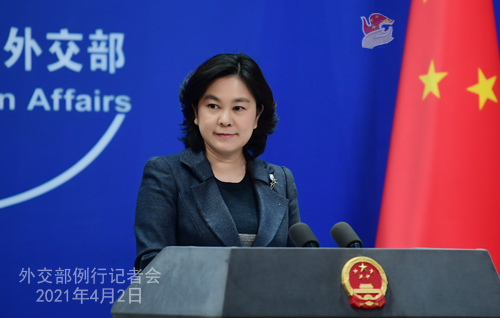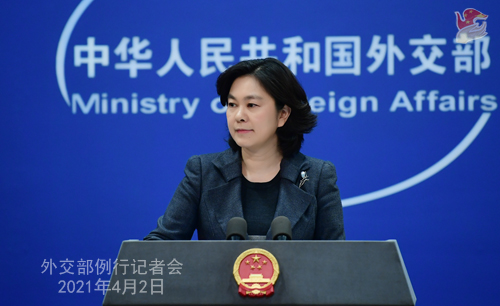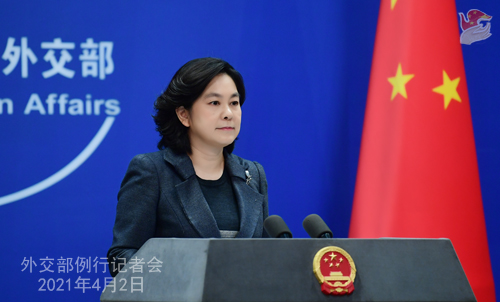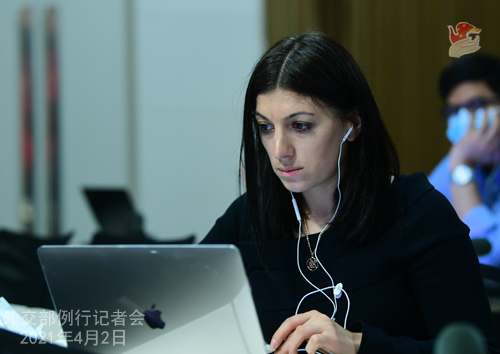| Foreign Ministry Spokesperson Hua Chunying's Regular Press Conference on April 2, 2021 |
| 2021-04-02 20:37 |
|
CCTV: When State Councilor and Foreign Minister Wang Yi and Malaysian Foreign Minister Hishammuddin bin Tun Hussein met with the press yesterday, he said in Chinese that Malaysia and China are family and State Councilor Wang is his elder brother. The atmosphere was very warm and cordial. What is China's comment on Foreign Minister Hishammuddin bin Tun Hussein's visit and the current China-Malaysia relations? Hua Chunying: I also watched this video clip online. Foreign Minister Hishammuddin bin Tun Hussein expressed his feelings in Chinese, and State Councilor Wang gave him a thumbs-up, saying "we are brothers". We can feel the warm friendship between China and Malaysia through this cordial interaction even behind the screen. This is a vivid illustration of the China-Malaysia comprehensive strategic partnership. China and Malaysia are good neighbors with a millennium-old friendship. We are good partners in jointly building the BRI and good brothers in the fight against the epidemic. We both support sovereign equality, oppose interference in internal affairs, and are committed to building international relations featuring mutual respect, fairness, justice and win-win cooperation. In recent years, with the concerted efforts from both sides, our bilateral relations have been growing with great cooperation potential in the future. During Foreign Minister Hishammuddin bin Tun Hussein's visit, the two sides have had in-depth exchanges in a friendly atmosphere and reached an important five-point consensus. Going forward, the two sides will launch a high-level committee on cooperation to further synergize development strategies for high-quality BRI cooperation. The two sides will also discuss the mutual recognition of health code and facilitate cross-border travels with regular epidemic control in place so as to resume frequent exchanges between the two peoples. We also stand ready to work together for the early entry into force and implementation of the Regional Comprehensive Economic Partnership (RCEP) and safeguard peace and stability in the South China Sea. Foreign Minister Hishammuddin bin Tun Hussein also said that Malaysia appreciates China's aid in its fight against COVID-19, which is a testament to "Malaysia and China being one family". In the future, Malaysia will become the second in the region to cooperate with China on vaccine production after Indonesia. We will combat "vaccine nationalism" with concrete actions. In these two days, State Councilor Wang also hosted Singaporean Foreign Minister, and is going to hold talks with the foreign ministers of Indonesia and the Philippines today. The visits of the foreign ministers of the four Southeast Asian countries have once again demonstrated the deep friendship between China and its Southeast Asian neighbors, with growing affinity through closer interactions. China is committed to working with our neighbors to improve our relations, enhance mutual strategic trust and elevate bilateral relations and China-ASEAN relations to new heights. China Daily: Russian Foreign Minister Sergey Lavrov said yesterday in an interview on Russia's Channel One that the China and Russia have no intention of coordinating a joint stance against the US and Western countries' stupid sanctions. Russia-China relationship does not target a third party. It is a new type of state-to-state relationship, not a military alliance in the classic sense, but is even closer in a certain sense. He also commended China's development path and governing pattern, and responded to criticisms in the name of human rights. What is China's comment? Hua Chunying: We appreciate Foreign Minister Lavrov's positive comments on China's development and China-Russia relations, and thank the Russian side for speaking up for China and offering strong support on issues concerning China's core interests. A partnership forged with the right approach defies distance. Unlike certain western countries that pursue supremacy, interference in other countries' internal affairs, zero-sum game, and wanton unilateral sanctions, China and Russia have set an example of being major countries committed to equality, integrity, cooperation and law abidance. Upholding the central role of the United Nations and authority of international law, we decide our positions on issues on the basis of their own merits, and follow the principle of non-alliance, non-confrontation and non-targeting at any third party, which stands in stark contrast with the military alliance among certain countries. Having stood the test of the COVID-19 epidemic and other major changes unseen in a century, China-Russia relations have reached an all-time high in all aspects, becoming an important force for maintaining global strategic security and stability, and a pillar of strength for upholding multilateralism, fairness and justice. Our successful relations can be attributed to the fact that both sides are committed to the principle of non-alliance, non-confrontation and non-targeting at any third party, that we respect each other's core interests and accommodate each other's legitimate concerns, and that we always act in a responsible manner, uphold justice, and safeguard the international system with the United Nations at its core and the international order based on international law. We are committed to building a strategic partnership of coordination featuring lasting friendship. We are neither interested in nor will stoop to engaging in any exclusive bloc that instigate intolerance and confrontation. No matter how the international landscape may change, China-Russia comprehensive strategic coordination for the new era will only be stronger and broader. China will continue to work with Russia and the broader international community to support and practice multilateralism in real sense, promote greater democracy in international relations, uphold the common values of peace, development, fairness, justice, democracy and freedom for all mankind, and jointly build a community with a shared future for mankind that transcends differences in systems and civilizations.
Beijing Youth Daily: We understand that SCO Secretary-General Vladimir Norov and some foreign diplomats posted in China including ambassadors are visiting Xinjiang as we speak. Could you give us more information on that? Hua Chunying: A group of over 30 people including SCO Secretary-General Vladimir Norov and ambassadors and other diplomats posted in China by more than 20 countries went to visit Xinjiang on March 30 and the trip ends today on April 2. Li Hui, Special Representative of the Chinese Government on Eurasia accompanied the delegation. During the trip, Secretary-General Norov and others went to places including Urumqi, Kashgar and Aksu. They visited an exhibition on counter-terrorism and de-radicalization, the International Grand Bazaar Urumqi, the Kashgar Old Town, the Aitigaer Mosque, a water station serving rural areas in Jiashi County and a memorial for the greening project in Kekeya. Through these site visits, the group saw with their own eyes how Xinjiang enjoys unprecedented social stability, ethnic and religious harmony and steady economic growth. They toured several large companies, visited local Uyghur families and learned how the region realized remarkable economic development, improved living standards and protected human rights on the basis of maintaining stability. They also expressed readiness to promote cooperation between their countries and Xinjiang, in particular in counter-terrorism, de-radicalization and trade. Today at noon, the delegation attended an interactive session themed "Xinjiang is a wonderful place", where Shohrat Zakir, Chairman of Xinjiang Uyghur Autonomous Region, and representatives from various sectors in the region held exchanges with them. At the session, Secretary-General Norov and many ambassadors and other diplomats shared their thoughts from the visit and said that seeing is believing. They said that what they saw proves that the allegations by certain countries of so-called human rights violations, religious discrimination and forced labor are simply groundless and the allegation of "genocide" is even more preposterous. This afternoon, Chen Quanguo, member of the Politburo of the CPC Central Committee and Secretary of the CPC Xinjiang Uyghur Autonomous Region Committee will meet with the delegation and give a full account of the region's social and economic progress. As I just stated, through this visit, the group got to know the truth about Xinjiang, a region that enjoys social stability, economic growth and ethnic unity like never before. These outcomes are truly hard-won. Today CGTN released the fourth documentary on fighting terrorism in Xinjiang "The War in the Shadows", giving a panoramic view of Xinjiang's war on terrorism and extremism. After viewing this documentary, you can understand how in earlier years, Xinjiang suffered heavy losses from terrorism and extremism, which posed a severe threat to people's safety. With unrelenting efforts, today the region has not seen a single violent terrorist case for more than four consecutive years. It has achieved high quality social and economic development. However, certain anti-China forces in the US and other Western countries would not give up and fabricated all sorts of lies, rumors and disinformation with no scruples whatsoever. They produced false allegations such as "forced labor" and "genocide" to serve their strategic conspiracy of destabilizing Xinjiang and containing China's development. They have even turned to make an issue out of Xinjiang cotton. I've noted the statement from China Cotton Association yesterday, which firmly rejects the imposition of any sanctions on Xinjiang's textile and apparel supply chain and relevant products by Western countries led by the US and supports inviting foreign industrial associations, retailer brands and third-party institutions to conduct studies in Xinjiang. This shows how open, aboveboard and transparent Xinjiang is. We sincerely welcome people from various sectors in foreign countries to visit Xinjiang and see the beautiful scenery, people's happy life and the region's economic development. Rumors cannot spread when people are truly well-informed. Justice will always prevail. Beijing Media Network: Lately, US President Joe Biden outlined a $2.25 trillion employment plan for the next eight years, which he said would enable the US to "out-compete" China in the global competition. Could I have your comment on this? Hua Chunying: We will not comment on the US infrastructure plan, as it is its internal affair. However, I believe that the ultimate goal of infrastructure development in any country should be to promote economic and social development, and help improve people's wellbeing. Since the reform and opening up, China has made great achievements in infrastructure development. At present, China has 38,000 kilometers of high-speed railways in service and nearly 150,000 kilometers of expressways, both ranking the first in the world. A number of new infrastructure projects, such as the Fuxing Hao trains, the Hong Kong-Zhuhai-Macao Bridge and the Beijing Daxing International Airport, have become shining brand names of China. In addition, China has built the world's largest network of optical fibers and mobile communications, extending fiber-optic service to urban homes and broadband connectivity to villages. In the past, the goal was to build grand bridges to turn deep chasms into thoroughfares. Now, the convenient transportation has turned China's 9.6-million-square-kilometer land into a huge one-day economic circle. On top of that, the construction of new types of infrastructure, such as 5G, the Internet of Things, artificial intelligence and the industrial Internet, is flourishing, which will greatly reinvigorate traditional industries, form new areas of economic growth, and promote sustained and high-quality economic development. China's achievements in infrastructure development have been or are being translated into tangible benefits for the 1.4 billion Chinese people, helping them improve work efficiency, and making their lives more convenient and prosperous. Besides success at home, China is also conducting infrastructure cooperation with many other countries, especially BRI partner countries, which has played an important role in promoting local economic development and improving local people's livelihood. As China is fostering a new development paradigm, we will open wider, and work with other countries to better ourselves and help each other grow, and share with the world more dividends of China's development.
Bloomberg: A question on a possible summit. South Korea's national security advisor Suh Hoon told the US Secretary of State Antony Blinken that there are signs that China and North Korea are preparing for a high-level meeting. Can you confirm that? Does the foreign ministry have any more details on this issue? Hua Chunying: China and the DPRK are friendly neighbors linked by mountains and rivers. The two sides always maintain communication over exchanges in various sectors and at various levels. As to your specific question, I don't have any information to offer at this moment. Global Times: US Department of State spokesperson Price said yesterday that "we are committed to deepening ties with Taiwan...it is a critical economic and security partner of the United States, and that's why we will continue to engage Taiwan consistent with the longstanding "one China" policy. We will consider, just as we have, opportunities for visits to Washington and Taipei by senior-level authorities that advance our unofficial relationship." Do you have any response? Hua Chunying: We noticed that recently, there have been unusual interactions between the US and Taiwan, and the latest ploy even entails the US ambassador's joining of the delegation of Palau. Does the US really care about the people in Taiwan? Or is it using Taiwan as a pawn in its plot to contain China? I think we all see through its real intention. But I want stress that China's position on the Taiwan question is consistent and clear. There is but one China in the world. The Taiwan region is an inalienable part of the Chinese territory. The People's Republic of China is the sole legal government representing the whole of China. This is a fact recognized by the international community. The Taiwan question is the most important and sensitive issue between China and the US. The one-China principle is the political foundation of China-US relations and a red line that cannot be crossed. We urge the US side to fully understand the highly sensitive nature of the Taiwan question, abide by the one-China principle and the three China-US joint communiques, stop the dangerous practice of challenging the bottom line and playing with fire as the previous administration did and stop official exchange with Taiwan in any form. It should prudently and properly handle Taiwan-related issues, refrain from sending any wrong signals to the Taiwan independence forces in order to avoid serious damage to China-US relations and peace and stability in the Taiwan strait. NHK: The UN Security Council released a statement on the situation in Myanmar condemning the use of violence against peaceful protesters on April 1. Meanwhile there are reports saying that China and Russia do not support sanctions on the military in Myanmar. Do you have a comment? Second, the EU said a virtual meeting of the Joint Commission of the Joint Comprehensive Plan of Action (JCPOA) will be held today to discuss the prospect of a possible return of the United States to the JCPOA and how to ensure the full and effective implementation of the agreement by all sides. Does China have any proposal for this upcoming meeting? Hua Chunying: On your first question, China is concerned about the tense situation in Myanmar. Over the past couple of days, State Councilor and Foreign Minister Wang Yi held discussions over the situation in Myanmar respectively with visiting Singaporean Foreign Minister Vivian Balakrishnan and Malaysian Foreign Minister Hishammuddin Hussein and stated China's position. China and ASEAN states share many consensuses on the situation in Myanmar. Myanmar is a member of the ASEAN family. China is Myanmar's close neighbor linked by mountains and rivers. It is China's sincere hope that the parties and sides in Myanmar will proceed from the long-term interests of the nation and people, start dialogue and consultation as soon as possible, bridge differences under the constitutional and legal framework and continue to advance the hard-won democratic transition process. China is deeply concerned about the violence and bloodshed in Myanmar, which serves no party's interests and only brings suffering to the Myanmar people. We hope relevant sides will put the people's fundamental interests first, exercise restraint, prevent the situation from escalating out of control, and stay committed to dialogue and consultation to deescalate the situation and reduce the temperature. China holds that the international community should strive to foster an enabling environment for domestic political reconciliation in Myanmar on the basis of non-interference, a basic norm of international relations. It should not overstep its authority or exert pressure wantonly. China firmly supports ASEAN in its continued efforts to facilitate peace talks in the ASEAN Way. We support the early convening of an ASEAN leaders' special meeting to mediate. On your second question, the Iranian nuclear situation is at a critical stage. China has all along taken a just position and played a constructive role on the issue. We will take an active part in the JCPOA video conference to consolidate the consensus on preserving the JCPOA and discuss a roadmap for US and Iranian resumption of compliance in a synchronized, reciprocal manner, and work for the JCPOA to get back on track at an early date. I want to stress that the US unilateral withdrawal from the JCPOA is the root cause of the tension in the Iranian nuclear situation. We welcome the willingness of the US side to return to the JCPOA. The pressing task now is for the US to lift all illegal sanctions against Iran and long-arm jurisdiction over a third party. This is an inherent requirement of the return to the JCPOA. On this basis, Iran should resume full implementation of the nuclear deal. China will work with other parties to advance the political settlement process of the Iranian nuclear issue, and at the same time resolutely safeguard its legitimate rights and interests.
Xinhua News Agency: A recent joint report by US and European think tanks says that China is retreating from its commitments under the G20 Debt Service Suspension Initiative (DSSI). Could you brief us on China's implementation of the DSSI? Hua Chunying: China has made its position clear on many occasions. In line with the G20 consensus, China has fully implemented the G20 Debt Service Suspension Initiative for Poorest Countries. The total debt service payments suspended amount to 1.3 billion dollars, the largest among G20 members. In addition, China's non-official financial institutions have also taken debt service suspension actions in a comparable manner with reference to the DSSI provisions, which is rare among G20 countries. China also actively supports the G20 consensus on a six-month extension of the DSSI, and will take part in the multilateral debt management appropriately on a case-by-case basis. These measures taken by China have played a positive role in easing the debt burden of relevant countries. Meanwhile, I would like to point out that developing countries' debt issue is a long-standing one, and it is about development in essence. That has been further aggravated by the recent COVID-19 pandemic and the volatility of commodity markets, and impacted by the macro-economic measures of major economies. According to authoritative international agencies, multilateral development banks and private creditors, mainly commercial institutions of developed countries, account for a large part of the debt structure of these heavily indebted poor countries (HIPC). For example, multilateral financial institutions and commercial creditors account for more than three quarters of the total external debt owed by African countries. Their claims are an important cause of these countries' debt problems, and they bear a greater responsibility in helping developing countries reduce their debt burden. China calls on these institutions to contribute to alleviating the debt burden of developing countries. Bloomberg: The US National Security Advisor Jake Sullivan spoke with his counterpart in the Philippines, regarding the recent massing of Chinese vessels at Whitsun Reef. This is according to a White House statement. Do you have any comment on this discussion between Jake Sullivan with his counterpart in the Philippines? Hua Chunying: We've repeatedly responded to questions relating to the South China Sea. Other sides have no right to make wanton remarks on the normal act of Chinese fishing ships operating and sheltering from the wind in relevant waters. China and the Philippines have maintained close communication on issues relating to the South China Sea. We are committed to safeguarding peace and stability in the waters and hope the US will refrain from attempts to drive wedges and stoke differences. *** In observance of the Qingming Festival (Tomb-sweeping Day), our press conference will be adjourned for Monday, April 5 and resumed on Tuesday, April 6. In the meantime, you can still reach the spokesperson's office by fax, Wechat or email.
|





